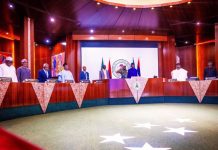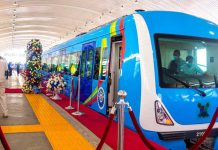
Talks about Economic Diversification agenda had become like a sing-song in Nigeria. For years, government functionaries kept inundating the media and the people of tons and tons of economic theories and strategies they had in store. It was like great motion but no movement.
But last week, President Muhammadu Buhari took a vital stride towards meaningful action by inaugurating the Inland Dry Port in Kaduna. Earlier, he had also inaugurated ten new train coaches and locomotives at the Rigassa train station in Kaduna to specifically ferry commuters along the Abuja-Kaduna route.
Speaking at the inauguration of the dry port, President Buhari warned the Nigerian Customs Service and Port officials against frustrating business activities at Inland dry ports in the country.
He charged Customs and Port officials to make the facilities work and not to frustrate business, commercial and industrial enterprises with unnecessary bureaucracy and delays, thereby defeating the objective of the whole exercise as it was in in the past.
The Nigerian leader said apart from the Kaduna Inland Dry Port, work in six other dry ports located in Ibadan, Aba, Kano, Jos, Funtua and Maiduguri, had been fast-tracked and were at various stages of completion. He urged relevant stakeholders across the public and private sectors to utilise the facilities optimally.
President Buhari noted that the hinterland business community had waited for too long for such facility with tremendous potentials to ease the way of doing international business for interior based importers and exporters, pointing out that when completed, the dry ports would reduce congestionn and traffic gridlock at the sea ports while time and cost of doing business would be reduced.
Picking up from where President Buhari stopped, the Minister of Transport, Mr. Rotimi Amaechi described “the development of inland dry port as an important factor in Nigeria’s economic development efforts as ports of origin for exports and ports of destination for imports.”
According to Mr. Amaechi, “The Inland Dry Ports will accelerate the implementation of the nation’s economic diversification policy. The concept of Inland Dry Port has gained widespread importance with the tremendous changes in international transportation as a result of the container revolution and the introduction of door-to-door delivery of cargo. It provides importers and exporters located within the nation’s hinterland, especially industrial and commercial outfits, access to shipping and port services without necessarily visiting the seaports”.
For the Transportation Minister, “It also enables importers and exporters to process clearance of their import cargo and take delivery of their raw materials and machinery close to their places of business. Furthermore, the Inland Dry Ports will also provide our exporters the much needed facilities to process, package, consolidate and forward their exports to their customers all over the world without having to physically be at the seaports”.
The guests and representatives of the business community who attended the event generally acclaimed the expressed government direction. What remains is to see how they fare in practice.

















